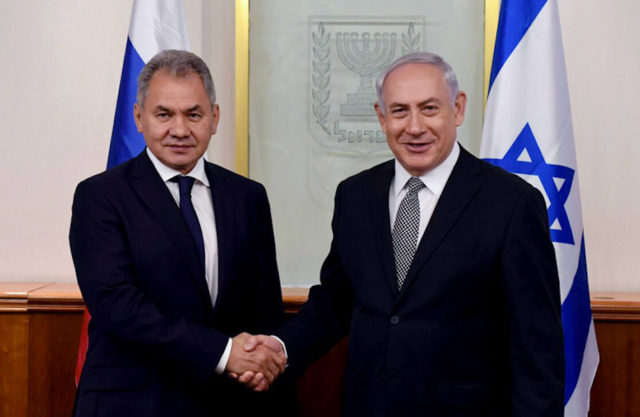
Israeli Prime Minister Benjamin Netanyahu hosted Russian Defense Minister Sergei Shoigu in Jerusalem earlier this week to have a candid conversation about the war in Syria. Just hours before the visit, an Israeli warplane bombed a Syrian surface-to-air missile site, highlighting the volatile nature of the ongoing conflict.
For Israeli leaders, Iran’s influence in Syria topped the agenda, specifically Iran’s attempts to establish a permanent military presence in the country. “Iran needs to understand that Israel will not allow this,” said the prime minister. But, the Islamic Republic has already stationed thousands of soldiers with its Revolutionary Guard Corps in the country to assist Syrian President Bashar al-Asad, and it operates with a level of autonomy. Additionally, Hezbollah, an Iranian-backed terrorist organization, has expanded operations on the Syrian side of the Golan Heights. According to reports, Israeli leaders asked Russia to enforce a 25-mile buffer zone between the group and the Israeli border, but Moscow thought the request was unrealistic, and suggested only three miles.
Prime Minister Netanyahu and other defense officials have repeatedly warned of “red lines” that would lead to military interventions in Syria, including the transfer of advanced weapons from Iran to Hezbollah and the Iranian presence on Israel’s northern border.
While Netanyahu conveyed a clear message publicly, the Russian defense ministry declined to make a statement addressing Jerusalem’s concerns. A Russian deputy minister expressed that the meeting gave “additional impetus to the development of Russian-Israeli cooperation,” according to Sputnik, a media outlet close to the Kremlin.
The ultimate misfortune for Israel is that Russian and Iran have different goals in Syria.
Russia is looking toward the exits in Syria, having achieved many of its deliberately limited goals. After negotiating a shallow ceasefire agreement with Turkey and Iran to divide the country into areas of influence, the Kremlin has secured a friendly government in Damascus and its military facilities at Latakia and Tartus. During that time, the Islamic State – an enemy of Russia as well as the Damascus government – has lost much of its territory, and the White House seems to have little interest or leverage in forcing an alternative political settlement.
Iran, on the other hand, sees its presence in Syria as a critical opportunity to extend its reach continuously for hundreds of miles from Tehran to the Mediterranean Sea. With Shiite militias in Iraq, Syria, and Lebanon that constitute shadow governments already friendly to the Islamic Republic, Iran has expanded and deepened a staunchly anti-Western and anti-Israel military capacity throughout the Middle East.

